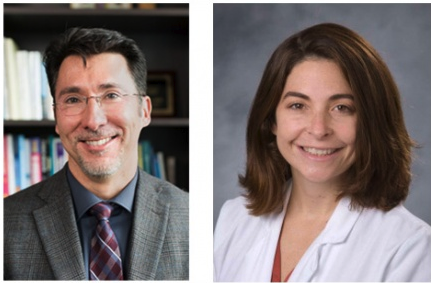New Faculty: August 2020
A warm welcome to new Department of Medicine faculty members who started in August 2020!
Duke Internal Medicine Residency Program renames Chair's Conference to honor Harvey Cohen
The Duke Internal Medicine Residency Program has renamed one of its weekly noon conferences, Chair's Conference, to honor Harvey Jay Cohen, MD, Walter Kempner Distinguished Professor in the School of Medicine and former Chair of the Department of Medicine.
Divisions select faculty recipients for 2020 Excellence in Education Awards
The recipients of the Department of Medicine faculty Excellence in Education Awards have been announced.
Parkinson’s and bone health
Over his long career, Kenneth Lyles, MD, professor of medicine (Geriatrics), has worked to find better treatments and prevention tips for older patients .
“My passion is old people with bone disease, and I love to do clinical trials," says Dr. Lyles.
Lessons from Master Mentors
The Department of Medicine is proud to announce the recipients of the 2020 DOM Research Mentoring Awards, which recognize outstanding mentors among our faculty.
Morey receives VA's Paul B. Magnuson Award
Miriam Morey, PhD, professor of medicine (Geriatrics) has been awarded the Paul B. Magnuson Award, the VA Rehabilitation Research and Development Service's highest honor. It is given to recognize humanitarianism and dedication in service to Veterans.
13 Medicine faculty recognized by the School of Medicine
Congratulations to the Department of Medicine faculty who are being recognized by the School of Medicine for their leadership, service, mentoring, and professionalism.
Cathleen Colon-Emeric: How to support older relatives during the COVID-19 outbreak
Like many of us, Cathleen Colón-Emeric, MD, chief of the Division of Geriatrics, has older parents who live nearby. Here are some of her suggestions for navigating the new and urgent conversations and decisions facing many families, including her own.
Duke team awarded $1.4 Million to train physician-scientists to address Alzheimer's disease and related dementias
The National Institutes of Health (NIH) has awarded Duke University $1.4 million over four years to train physician-scientists to address Alzheimer’s disease and related dementias (ADRDs).
The Stimulating Access to Research in Residency (StARR) R38 was awarded to a team of Duke University School of Medicine faculty led by Anthony Viera, MD, MPH, chair and professor, Department of Family Medicine and Community Health, and Heather Whitson, MD, MHS, associate professor of medicine (Geriatrics) and ophthalmology and director of the Duke Center for the Study of Aging and Human Development.




